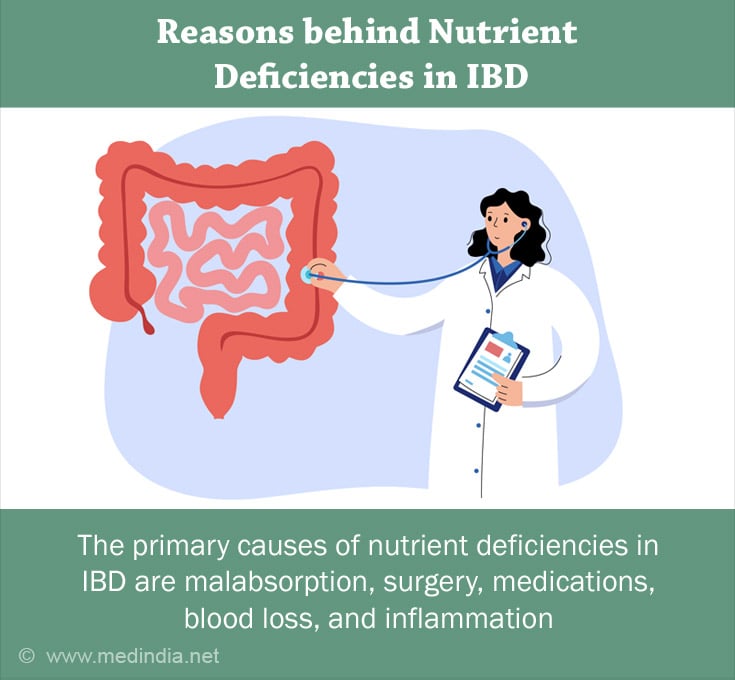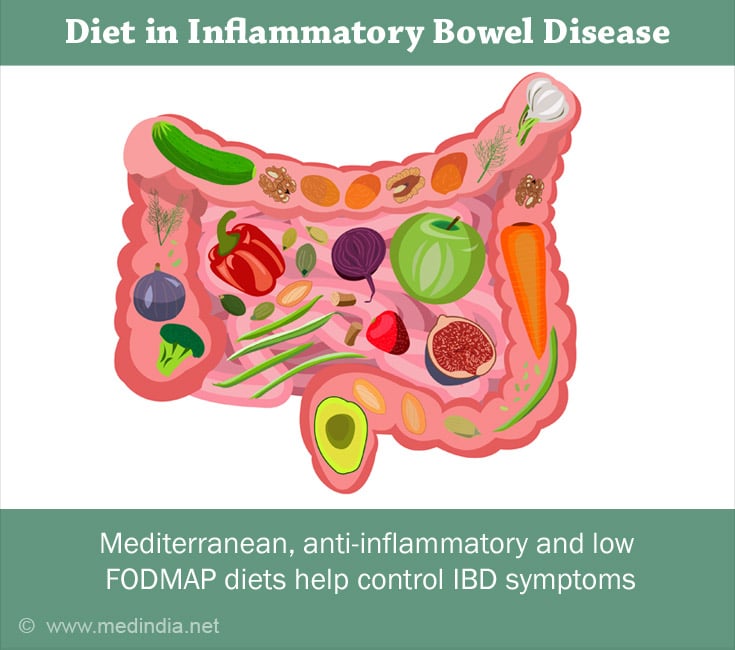- Inflammatory Bowel Disease - (https://www.ncbi.nlm.nih.gov/books/NBK470312/)
- Presenting symptoms in inflammatory bowel disease: descriptive analysis of a community-based inception cohort - (https://bmcgastroenterol.biomedcentral.com/articles/10.1186/s12876-019-0963-7)
- Inflammatory bowel disease: An Indian perspective - (https://journals.lww.com/ijmr/Fulltext/2021/04000/Inflammatory_bowel_disease__An_Indian_perspective.6.aspx)
- Incidence and risk factors of micronutrient deficiency in patients with IBD and intestinal Behcet's disease: folate, vitamin B12, 25-OH-vitamin D, and ferritin - (https://bmcgastroenterol.biomedcentral.com/articles/10.1186/s12876-021-01609-8)
- Nutritional Aspects in Inflammatory Bowel Diseases - (https://www.mdpi.com/2072-6643/12/2/372)
- Common Micronutrient Deficiencies in IBD - (https://journals.lww.com/co-clinicalnutrition/Abstract/2015/11000/Micronutrient_deficiencies_in_inflammatory_bowel.9.aspx)
- Nutrition Tips for Inflammatory Bowel Disease - (https://www.ucsfhealth.org/education/nutrition-tips-for-inflammatory-bowel-disease)
- The role of diet in the prevention and treatment of Inflammatory Bowel Diseases - (https://www.mattioli1885journals.com/index.php/actabiomedica/article/view/7952)
- Role of diet and nutrition in inflammatory bowel disease - (https://www.wjgnet.com/2220-315x/full/v11/i1/1.htm)
What is Inflammatory Bowel Disease (IBD)?
Inflammatory Bowel Disease (IBD) arises due to an inappropriate action of the immune system in the intestinal flora and is ordinarily seen in genetically susceptible individuals. The root cause of the occurrence of IBD remains a mystery.
Characterized by repetitive episodes of inflammation in the gastrointestinal tract, IBD encompasses two types, namely Ulcerative colitis (UC) and Crohn's disease (CD). The two types are differentiated based on the location and the intensity (mild, moderate, and severe) of the inflammation.
Ulcerative colitis (UC) exhibits inflammation in the colonic mucosa. It is generally known to affect the rectum and may extend up to or beyond the sigmoid. In some scenarios, the entire colon up to the cecum could also be inflamed.
Crohn's disease depicts ulceration of any part of the gastrointestinal tract(1✔ ✔Trusted Source
Inflammatory Bowel Disease
Go to source).
Most Prominent Signs of Inflammatory Bowel Disease?
Manifestations of the disease may vary depending on the etiology of the inflammation. According to the World Gastroenterology Organization symptoms of IBD include:
- Diarrhea associated with mucous or blood, nocturnal diarrhea, fecal incontinence.
- In patients with UC constipation may be reported when the rectum is inflamed.
- Abdominal pain is common. The two types of IBD can be differentiated by the location of the pain. Crohn’s exhibits pain in the right lower quadrant whereas in UC pain occurs in the left lower quadrant.
- Nausea and vomiting are frequently observed in CD.
- Weight loss and fatigue. A study that examined the symptoms throughout the duration of the disease found diarrhea and fatigue to be the most prominent symptoms in CD while in UC to be diarrhea and bloody bowel movement(1✔ ✔Trusted Source
Inflammatory Bowel Disease
Go to source, 2✔ ✔Trusted Source
Presenting symptoms in inflammatory bowel disease: descriptive analysis of a community-based inception cohort
Go to source).
Prevalence of IBD
IBD prevalence is rising globally, and India is reported to have the highest cases among South and Southeast Asian countries. Research states higher prevalence among men however, the disease severity is mild in both genders. A spike in pediatric IBD cases is also being seen. Changes in Indian dietary patterns due to urbanization and genetic predisposition could be the contributing factors to the rising burden of IBD(3✔ ✔Trusted Source
Inflammatory bowel disease: An Indian perspective
Go to source).
Common Nutrient Deficiencies in IBD
Nutritional aspects pose to be very relevant in IBD as they shine influence on the disease activity and morbidity. Micronutrient (vitamins, minerals, and trace elements) deficiency is commonly reported in patients with IBD(4✔ ✔Trusted Source
Incidence and risk factors of micronutrient deficiency in patients with IBD and intestinal Behcet's disease: folate, vitamin B12, 25-OH-vitamin D, and ferritin
Go to source). The most prevailing micronutrient deficiencies are discussed below -
- Iron: About 30% to 90% of the patients report being deficient in iron. However, the frequency of iron deficiency is higher in UC (81%) when compared to CD (39%). The main causes of iron deficiency include insufficient intake of iron-rich foods, active inflammation causing blood loss, impaired utilization of iron due to systemic inflammation, and impaired iron uptake by the duodeno-jejunal mucosa. In cases of inactive disease, serum ferritin levels should be considered to conclude deficiency(5✔ ✔Trusted Source
Nutritional Aspects in Inflammatory Bowel Diseases
Go to source). - Vitamin B12: In Crohn's, B12 deficiency is reported in about 48% of the patients. The risk factors for B12 deficiency are inflammation in the terminal ileum, significant gastric resection, a vegetarian diet, and small intestinal bacterial overgrowth (SIBO)(6✔ ✔Trusted Source
Common Micronutrient Deficiencies in IBD
Go to source). - Vitamin D: About 75% of CD patients may be Vitamin D deficient. Use of corticosteroids, small intestinal bacterial overgrowth (SIBO), and malabsorption may raise the risk bar of Vitamin D deficiency(5✔ ✔Trusted Source
Nutritional Aspects in Inflammatory Bowel Diseases
Go to source, 6✔ ✔Trusted Source
Common Micronutrient Deficiencies in IBD
Go to source). - Calcium: The common reasons behind calcium deficiency are reduced PTH (parathyroid hormone) activity, use of corticosteroids, and low Vitamin D levels(6✔ ✔Trusted Source
Common Micronutrient Deficiencies in IBD
Go to source). - Magnesium: Severe or chronic diarrhea, being the frequently reported symptom in IBD is the major causative factor for magnesium deficiency. The symptoms could be frank seizures, arrhythmia, and neuromuscular hyperexcitability(6✔ ✔Trusted Source
Common Micronutrient Deficiencies in IBD
Go to source). - Zinc: Impaired nutrient absorption, diarrhea, use of proton pump inhibitors or H2 blockers, low protein levels, and following a vegetarian diet are the risk factors for zinc deficiency in IBD(6✔ ✔Trusted Source
Common Micronutrient Deficiencies in IBD
Go to source). - Folic Acid: Patients with CD (54%) more frequently report folic acid deficiency. The common determinants of its deficiency are malabsorption and inadequate intake(5✔ ✔Trusted Source
Nutritional Aspects in Inflammatory Bowel Diseases
Go to source).
Causes of Nutrient Deficiencies in IBD
The major reasons behind the deficiencies observed in IBD are discussed in the space below.
- Malabsorption is strongly interlinked with the mucosal alterations happening in IBD like loss of epithelial integrity and impaired epithelial transport. The involvement of the ileum in CD turns down the absorption of nutrients.
- Chronic loss of blood and proteins within the intestinal lumen could be caused due to active inflammation. The modifications in the transport of ions also may lead to the loss of fluids and electrolytes.
- Inflammation and Surgery stand as critical elements in malabsorption, diarrhea, and henceforth malnutrition. Resection of intestinal segments brings down digestion and absorption of nutrients and reduces the uptake of bile acids. Chronic inflammation also hastens gastrointestinal transit, reducing contact with the mucosal layers which in turn affects the absorption of nutrients.

- Reduced food intake could be the side effect of certain medications which may induce vomiting, nausea, diarrhea, and abdominal pain. Long-term usage of folic acid antagonists like sulfasalazine may cause anemia. Glucocorticoids have been shown to stimulate zinc, phosphorus, and calcium deficiency. Other medications that cause nutritional side effects are prednisone (calcium, potassium, zinc, and Vitamin C deficiency), cholestyramine (reduced absorption of vitamin B12, A, D, E, K, calcium, and iron), and sulfasalazine (interferes in folate absorption)(7✔ ✔Trusted Source
Nutrition Tips for Inflammatory Bowel Disease
Go to source).
Consequences of Nutrient Deficiencies in IBD
The consequences of undiagnosed or untreated micronutrient deficiencies include:
- Anemia (due to deficiency of iron, Vitamin B12, and folate)
- Impaired thrombosis (due to deficiency of Vitamin B6, B12, and folate)
- Impaired wound healing (due to deficiency of zinc, Vitamin A, and C)
- Loss of bone mineral density (due to deficiency of Vitamin D, calcium, magnesium, and Vitamin K)
- Carcinogenesis (due to deficiency of calcium, Vitamin D, and folate)
- Impaired treatment response(4✔ ✔Trusted Source
Incidence and risk factors of micronutrient deficiency in patients with IBD and intestinal Behcet's disease: folate, vitamin B12, 25-OH-vitamin D, and ferritin
Go to source)
Prevention and Treatment of Nutrient Deficiencies in IBD
The European Society for Clinical Nutrition and Metabolism suggests that patients with IBD regularly track their micronutrient status and correct deficits. Understanding the risk factors of the most prevailing nutrient deficiencies and taking the relevant actions is vital in prevention. Treating the symptoms that may carve the way to deficiency helps in positive therapy outcomes. Supplements (parenteral in active diseases) can be considered for treatment along with the right diet(4✔ ✔Trusted Source
Incidence and risk factors of micronutrient deficiency in patients with IBD and intestinal Behcet's disease: folate, vitamin B12, 25-OH-vitamin D, and ferritin
Go to source, 6✔ ✔Trusted Source
Common Micronutrient Deficiencies in IBD
Go to source).
Inflammatory Bowel Disease Diet
Diet sheds a great influence on the behavior of the disease and the risk of complications. Studies have shown that switching from Western diets to a Mediterranean diet containing vegetables, fruits, pulses, whole grains, olive oil, fish oil, nuts, and seeds may help meet essential nutrient requirements and maintain a healthy gut microbiota(8✔ ✔Trusted Source
The role of diet in the prevention and treatment of Inflammatory Bowel Diseases
Go to source).

The anti-inflammatory diet for IBD holds significant benefits. This diet allows for complex carbohydrates, prebiotics, and probiotics, assesses the eating pattern and fills in with missing nutrients, and modifies food texture based on the symptoms.
A study has reported that a low FODMAP (fermentable oligo-, di-, mono-saccharides, and polyols) diet positively modified the fecal microbiota in CD patients(9✔ ✔Trusted Source
Role of diet and nutrition in inflammatory bowel disease
Go to source).
In a Nutshell
Research has demonstrated poor nutritional status to be associated with poor response to therapy, poor quality of life, and increased risk for complications. Therefore, investigating the nutritional aspects involved in IBD plays a crucial role in identifying and preventing nutrient deficiencies.





